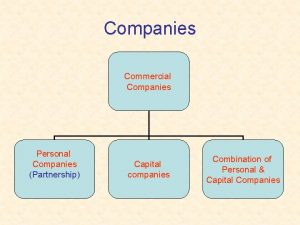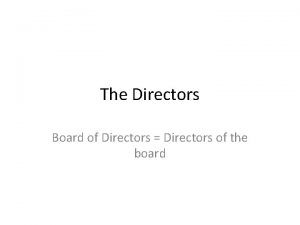Directors Who is a Director Companies are legal





- Slides: 5

Directors

• Who is a Director…? • Companies are legal persons. However, they are legal fictions. • Therefore, they neither have a body nor a soul. Eg - Ferguson V. Wilson • Who is responsible for acting on behalf of the company. . ? • Board of Directors • Shareholders at general meetings • As directors are there to manage the company and to represent the company, the importance of knowing their powers, duties and responsibilities have occurred. • The Companies Act plays a vital role in codifying such laws and regulations applicable to directors.

Definition of the Director • Based on the Substantive Functions Performed by different individuals, the Companies Act brings a wide group of people within the definition of Director. • Accordingly, a “Director” includes; • A person occupying the position of director of the company • Shadow Directors – Whose directions or instructions a director or the board of the company would be required to act. [Sec 187] • Any person to whom a power or the duty of the board has been directly delegated. • However, any person acting purely in the Professional Capacity does Not fall within the meaning of a Director.

• Exemption – Any. Delegation person who advices the company on substantial of Powers part of the company’s functions will fall within the category of “Director”. • Mainly You have two types of Directors; Eg - Secretary. Directors of State for Trade and Industry V. Deverell • Executive • Non-executive Directors • All Directors gain power from the Act and/or the Articles of a company. • Practically, executive and non-executive directors meet Periodically. Therefore, to undertake day-to-day company matters, they delegate their powers to others. • Such delegations take place either to; • Committees of Directors • A Director • Employees • Third parties

• The Act specifically recognizes the ability for a director to delegate his powers unless prohibited by the Articles or special situations as mentioned in the Act (Sixth Schedule). • Important – The board will still be responsible for exercise of such power if it has reasons to believe that; • The delegate is not exercising the power in conformity with the duties of directors as imposed by Law. • If the board fails to monitor the power used by delegates Eg – Section 186(2) Secretary of State for Trade and Industry V. Deverell • The delegation of power is subject to the implied condition that it should be exercised honestly and on behalf of the company.









